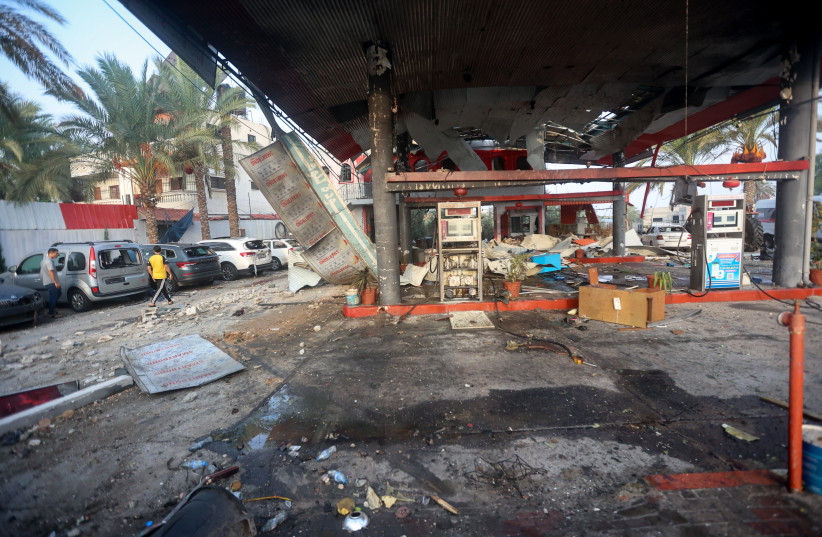The agenda of the recent Energy Intelligence Forum in London was “to debate and shape sustainable solutions to the energy challenges of the 21st century.” The three-day conference, held October 17-19 at a five-star hotel in the heart of the city, attracted nearly 100 energy leaders from around the world.
Russell Hardy, CEO of Vitol, the world’s top independent energy trader, addressed the forum on the first day. He said that despite the current war with Hamas, Israel is managing to maintain a steady supply of gas to its customers both domestically and internationally.
Israel’s Tamar gas field, with estimated reserves of around 315 bcm (billion cubic meters), usually meets around 70% of the country’s energy needs for power generation. Two days after the Hamas attack on Israel, however, Israel’s Energy Ministry instructed Chevron – a major partner in the consortium operating Tamar – to shut down production.
Reports indicate that the consortium was given to understand that this would be a temporary measure and that production would resume once the security situation stabilized. Tamar is located some 25 kilometers (15.5 miles) off the city of Ashdod, along Israel’s southern Mediterranean coast. The platform, which can be seen from the northern Gaza Strip on a clear day, is within range of rocket fire from Gaza.
Meanwhile, the Energy Ministry announced, “The economy’s energy needs will be supplied by alternative fuels… The electricity industry is preparing to use alternative fuels to power its stations.”

Israel is managing “to backfill from some of the other fields,” Hardy explained, “so my understanding is gas is still transferring to their customers and their international customers as well, largely in an intact way.” With something of a wink and a nudge, he added: “I think they probably have a little bit of spare capacity in the system.”
The three major Israeli fields
Three major Israel fields are currently in production – Tamar, Leviathan and Karish – with total estimated reserves of a trillion cubic meters. Leviathan, Israel’s largest offshore gas field, continues to operate normally. Four more fields have already been discovered and are awaiting exploitation – Zeus, Athena, Hermes, and Kallan. It is estimated that together, they amount to a further 108 bcm of natural gas.
EGYPT IMPORTS Israeli gas from both the Tamar and the Leviathan gas fields to help meet its domestic demand and for LNG exports from its two liquefaction plants.
The International Energy Agency (IEA) took a less optimistic view than Israel’s Energy Ministry. Its gas analyst, Gergely Molnar, speaking in a webinar on October 10, said that Tamar is a “very important” field when it comes to Israel’s and the region’s gas supply-demand balance.
“Closing the field temporarily,” he said, “can have impacts on gas deliveries to the domestic market in Israel, but also on the country’s export capability… When we are looking at the upstream sector in Egypt, we have already seen that it is struggling to keep up pace with rapidly rising domestic consumption as well as liquid natural gas (LNG) exports. If we take out Israeli pipe gas imports from that equation, it will harm the ability of Egypt to export LNG over the coming months.”
Reported data shows that Egypt exported only one LNG cargo in August and none in September due to high summer domestic-gas demand. Egyptian LNG exports so far this year have reached just less than half the total for 2022.
In June 2022, the European Commission, Israel, and Egypt signed a trilateral memorandum of understanding on the supply of Israeli gas via Egypt’s LNG export infrastructure to the European Union.
Because its own gas production has been declining for some time, Egypt negotiated a deal with Israel that was ratified on August 23, and Israel announced an increase in its natural gas sales to Egypt.
Explaining the new agreement, Israel’s Energy Minister Israel Katz said that gas exports to Egypt, currently about 5 bcm per annum, will be increased by 3.5 bcm per annum over 11 years, reaching a total annual sale of 43.5 bcm. This additional supply will enable Egypt to continue meeting its contracted exports as well as its domestic needs, he said.
“This step will increase the state’s revenue and strengthen diplomatic ties between Israel and Egypt,” Katz said.
IN A separate statement, Israel’s Energy Ministry said that Prime Minister Benjamin Netanyahu’s government has authorized Katz to order a state of emergency for the country’s energy sector if deemed necessary. Such a move, it said, would allow the government to allocate natural gas to consumers should supply shortages emerge.
Israel is expected to roughly double its gas output over the coming years, but Yogev Gardos, Israel’s budget director, in a letter to the director-general of the Energy Ministry, said that exporting too much “could endanger Israel’s energy security” and lead to higher electricity prices. Katz responded to the letter in a robust X (formerly Twitter) post: “Decisions on the gas sector take into account broad policy considerations, such as Israel’s standing, and the one who will make the decisions is me – the minister elected by the people. Not the professional echelon.”
He could afford to respond straight from the shoulder, knowing that Israel’s fourth offshore bidding round, launched in December 2022, was an outstanding success. Four groups of companies, amounting to nine companies in all, have bid to explore for additional offshore natural gas fields in Israeli waters. With the forthcoming pipeline exploration, Israel’s future – both regarding its own gas needs and as a remunerative gas-exporting nation – seems assured.
The writer is the Middle East correspondent for Eurasia Review. His latest book is Trump and the Holy Land: 2016-2020. Follow him at: www.a-mid-east-journal.blogspot.com.
